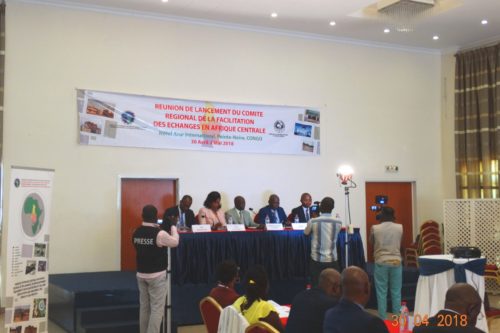TRADE FACILITATION AGREEMENT AT THE HEART OF EAC AND CEMAC CONCERNS

Ten countries out of eleven, members of the two regional economic communities, ECCAS and CEMAC, participated in the meeting to launch the Regional Trade Facilitation Committee (RFTF). meeting to launch the Regional Committee for Trade Facilitation (CRFE) at the Hotel Azur le Gilbert's in Pointe-Noire, from April 30 to May 1, 2018.
Representatives from Congo, DRC, Gabon, Cameroon, CAR, Chad, Sao Tome and Principe, Angola, Rwanda and Burundi are from the Ministry of Trade, the Directorate General of Customs, coordinators and focal points of the National Trade Facilitation Committees (CNFE). Jean-Jacques Samba, advisor to the President of Unicongo and coordinator of the Congo's CNFE, participated in the meeting. Experts from the CEMAC Commission, the ECCAS General Secretariat, the CNCED, the ADB, the OIF and the International Commission of the Congo-Oubangui-Sangha Basin (CICOS) also took part in this meeting which was chaired by the Deputy Secretary General of ECCAS and the Commissioner in charge of the Common Market.
The Trade Facilitation Agreement (TFA) reached at the Bali Bali Ministerial Conference in December 2013The Agreement on Trade Facilitation (AFE), concluded at the Bali Ministerial Conference in December 2013, entered into force on February 22, 2017, following its ratification by two-thirds of WTO Members. Congo, a member of the WTO since March 27, 1997 and of the GATT since May 3, 1963, ratified the TFA on October 5, 2017.
The AFE contains provisions to expedite the movement, release and clearance of goods including goods in transit. It also provides for measures to ensure effective cooperation between customs and other competent authorities on trade facilitation on trade facilitation and customs compliance issues. It also includes provisions for technical assistance and capacity building in this area.
At the regional level, important proposals for legislative changes related to trade facilitation have been introduced in the draft revised CEMAC customs code. They relate to: (i) the strengthening of operators' rights (ii) the right of appeal in customs matters; (iii) the computerization of procedures and electronic declarations (iv) simplification of procedures ; (v) coordinated border management (vi) and the Authorized Economic Operator (AEO) program(vi) and the Authorized Economic Operator (AEO) program, a central pillar of the customs-private sector partnership within the framework of the SAFE standards of the World Customs Organization (WCO). For its part, ECCAS has received support from the AfDB to implement the Trade Facilitation Agreement, in particular to strengthen dialogue and coordination between public and private sector stakeholders (ii) implement an institutional capacity building plan for the ECCAS Secretariat and member states (iii) and conduct a feasibility study for an ambitious regional trade facilitation program in the ECCAS region.
This meeting in Pointe-Noire allowed :
- The sharing of experiences Central African countries on the creation, implementation and operation of their National Trade Facilitation Committees (NTFC);
- L'examination and validation of the text relating to the creation and establishment of the regional committee for trade facilitation in Central Africa;
- The presentation of the Institutional Support Project for the Implementation of the Trade Facilitation Agreement (PAI-AFE);
- L'review and adoption the draft roadmap of the Regional Trade Facilitation Committee.
Participants were treated to a tour of the port of Pointe-Noire on the afternoon of April 30, 2018.
Share